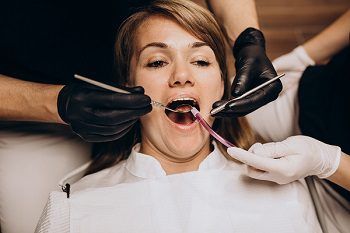Gingivoplasty: How does gum contouring fix a gummy smile?
When you have a gummy smile, it might make you feel self-conscious about your look. Moreover, many individuals are unaware that there is a way to minimize the appearance of your gums. However, Gingivoplasty, also called gum contouring, is a relatively simple surgery that alters the shape and proportions of your gums and teeth. It can often prevent you from experiencing your life to the fullest.
What is a gummy smile?
When the upper gums appear beneath the upper lip, especially when smiling, it is known as a "gummy smile." A gummy smile is primarily an aesthetic issue, giving the impression that one's smile is less appealing than it may be.
The perception of proportion largely determines the look of a gummy smile: the upper teeth, upper gums, upper lip, and position of the upper jaw all contribute to the appearance of a gummy smile when one or more are not proportional to the others. A smile is considered "gummy" when it reveals more than four millimeters of gum.

What causes a gummy smile?
The excessive gingival display can result from one or more of the following factors:
- Adult tooth and gum development
The gums accompany the adult teeth as they develop into the mouth. However, if the gum development extends beyond the normal front area of the teeth, a condition known as "altered passive eruption," the outcome may be a gummy smile.
Another "dentoalveolar extrusion" problem happens when the teeth, particularly the front teeth, grow excessively or "over-erupt." Along with the protracted tooth growth, the gums also overextend.
- Upper lip development and mobility
Your smile appears gummy when the upper lip is on the shorter side, displaying more teeth and gum when drawn tighter in a smile. Furthermore, some people have more movable lips, which pull open more in a smile.
- Some medicines' side effects
Some drugs might promote excessive gum growth around the teeth, a condition known as "gingival hyperplasia." According to the American Dental Association,
"Anti-convulsant pharmaceuticals (used to prevent seizures), immunosuppressant drugs (used to regulate auto-immune illnesses), and hypertension (high blood pressure) medications can all induce gum overgrowth in some persons."
Aside from the likelihood that gingival hyperplasia will result in a gummy smile, gum overgrowth can lead to periodontal disease, which should be treated whether or not a gummy smile is an issue.
How does Gingivoplasty treat a gummy smile?

Gingivoplasty is a technique that reshapes the look of the gums. This operation is also known as "gum contouring." Too-long gums on the front teeth might result in a "gummy smile." Gum contouring can correct minor gummy smiles.
Furthermore, gum contouring can be combined with bone recontouring, often known as crown lengthening, to treat a gummy smile.
What to expect during a gingivoplasty procedure?
During a gingivoplasty, a periodontist uses a tool to cut or reshape a piece of the gums. A scalpel, laser, or electrocautery are examples of such tools. One advantage of utilizing a laser for therapy rather than a scalpel or other cutting tool is that the laser can eliminate microorganisms on the teeth and mouth.
Gum contouring is an outpatient operation performed by periodontists in their clinic. While the techniques and materials used can vary slightly depending on your goals, below is a general overview of Gingivoplasty:
- Your periodontist will thoroughly clean your teeth to remove plaque.
- To numb the area, your periodontist injects a local anesthetic into the gums.
- Your periodontist uses a scalpel or laser tool to remove fragments of gum tissue to reveal more teeth.
- During the process, your periodontist will likely use a suction tool to remove extra saliva from your mouth.
- After the tissue removal, your periodontist will likely use a laser tool to vaporize the residual tissue and form the gumline.
- To protect your gums, your periodontist applies a soft putty-like substance and bandages to the area.
Some doctors may use Gingivoplasty with Botox injections to treat individuals with slight gummy smiles. Botox will inhibit the movement of the muscles that pull up the lip. The effect helps to lower the top lip when smiling, making the smile appear less "gummy." This is especially helpful when the cause of a gummy smile is a hyper-mobile upper lip that moves much higher when one smiles.
How much does Gingivoplasty cost?
A periodontist often performs a gingivoplasty. A cosmetic dentist may occasionally offer the procedure. Some of the things that may influence how much the process costs you are as follows:
- Surgical expertise
- Number of teeth the periodontist is addressing
Before the surgery, a periodontist usually provides a low-cost or complimentary consultation. The costs might range anywhere from $600 to $2,000 or more.
What are the risks of the gingivoplasty procedure?
Before the surgery, a periodontist should review the risks and potential adverse effects with you. Here are several examples:
- Bruising, which might last up to 48 hours (about 2 days) following the surgery
- Infection
- Discomfort and pain
Long-term consequences from Gingivoplasty are uncommon. However, you should contact your periodontist if you suffer symptoms such as persistent bleeding or pain that worsens rather than improves over time, swelling at the surgical site, or swelling at or below the jawline.
Conclusion
Gum contouring can improve the appearance of gummy smiles and help clients attain the look they desire. Gum contouring's ultimate goal is to restore the gums to a healthy, wholesome, and aesthetically acceptable state. Speak with a local dentist now to learn more about this procedure.
Contact your Danville dentist, Dr. Hoss Abar, DDS, MSD at Danville Orthodontics, to learn more about Gingivoplasty.
Resource:
This media/content or any other on this website does not prescribe, recommend, or prevent any treatment or procedure. Therefore, we highly recommend that you get the advice of a qualified dentist or other medical practitioners regarding your specific dental condition.
